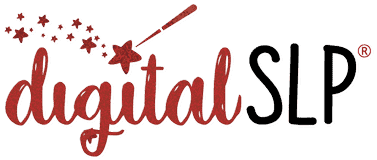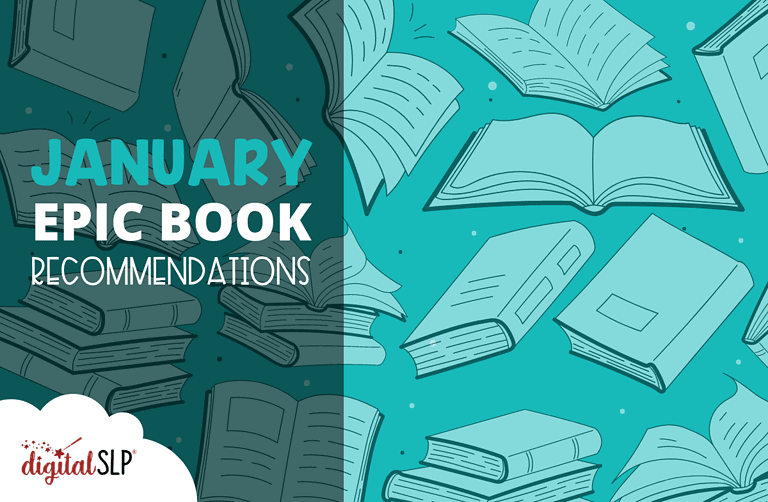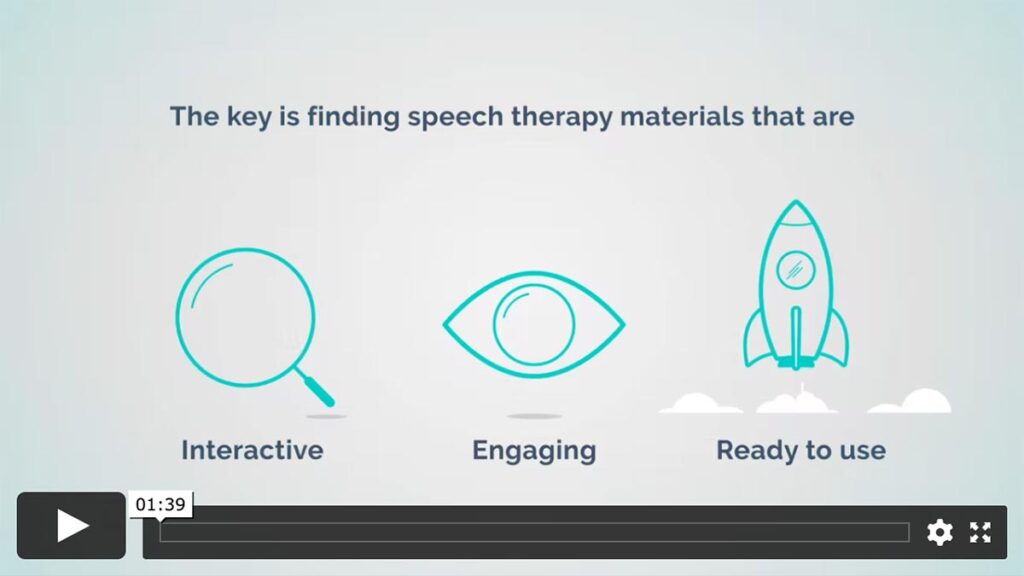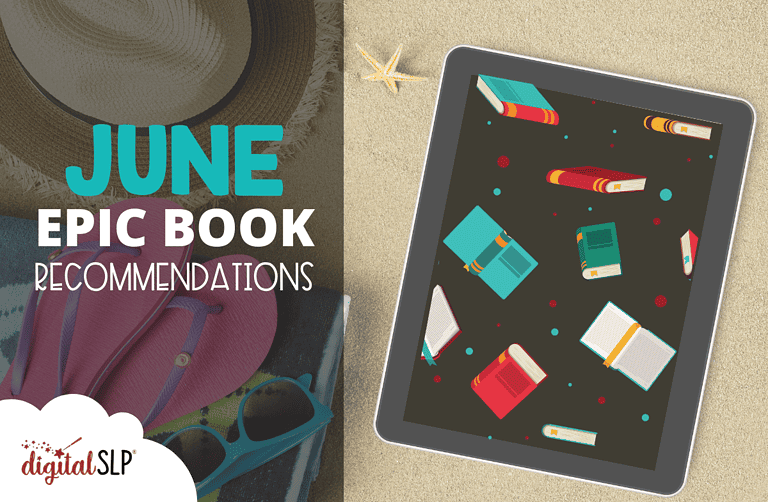This post contains affiliate links for which we may receive compensation at no additional cost to you. Click here to read our full affiliate policy.
Happy New Year! This year, we’re gathering our Epic book recommendations for January into a monthly blog post. This will allow us to include additional titles, as well as more extensive therapy ideas. We hope you enjoy the new format; please let us know what you think!
Our first recommendation this month is a very special one. The Map of Good Memories, by Fran Nuño, sensitively communicates the experiences of Zoe, who becomes a refugee after fleeing from an unnamed war. Before leaving her home country, Zoe creates a beautiful map of all the places that hold special memories for her.
This book is especially valuable in light of recent research findings indicating that many of the populations SLPs work with are at risk for poor autobiographical and episodic memory. One strategy to support these memory skills is “elaborative reminiscing,” in which SLPs use open-ended questions to help students expand on their recollections. After reading The Map of Good Memories, students could create their own maps, followed by elaborative reminiscing.
This would also be a perfect way to observe National Good Memory Day on January 23rd.
Therapy ideas and skills to target:
- Personal narrative: After creating their own map of good memories, students could select one location and share more about its significance.
- Perspective-taking: Students could make inferences about how Zoe feels at various points in the story.
- Extension: Students could research the historical and current situations involving refugees throughout the world.
To purchase a hard copy of The Map of Good Memories.
Memphis, Martin and the Mountaintop
Our next recommendation is Memphis, Martin, and the Mountaintop, by Alice Faye Duncan. This powerful book is perfect for honoring Dr. Martin Luther King Jr. on the third Monday of each January, and could be appropriate for a variety of ages, from late elementary to early middle school. It employs a unique multi-genre format (including poetry and personal narrative) to explore the Sanitation Strike of 1968. Dr. King’s philosophy of nonviolence and his assassination are also covered, in an accessible, age-appropriate way.
There are so many opportunities for deeper learning after reading this book! Students may want to research The National Civil Rights Museum (located at the site of Dr. King’s assassination), or study the history of Martin Luther King Jr. Day (it was a long and complex process that even involved the 1993 Super Bowl).
Therapy ideas and skills to target:
- Sequencing: Students could describe the major events of the 1968 Sanitation Strike.
- Poetry: Students could write their own poems about historical figures and milestones.
- Speeches and Personal Narrative: Students could research Dr. King’s “I Have a Dream” speech and share about their own personal dreams.
- Extension: In many cities, Martin Luther King Jr Day is commemorated by service projects and volunteer opportunities. If the logistics are possible in your context, these could be meaningful real-world activities for students.
To purchase a hard copy of Memphis, Martin, and the Mountaintop, click here.
Tracy Gunaratnam’s delightful book Not My Hats celebrates arctic animals with pizazz, humor, and gentle lessons about sharing, problem-solving, and friendship. The story is about a polar bear named Hettie, who loves her hats and refuses to share them with her puffin friend—until together, they come up with a solution that works for both of them.
Not My Hats is ideal for ages 4–9, but could work for learners who are slightly older or younger as well. It’s also a fun way to mark Polar Bear Plunge Day on January 1st, and National Hat Day on January 15th.
Therapy ideas and skills to target:
- Visual inferences: Ask students, “ What kind of animal is Hettie? How do you know?”
- Facial expressions and emotions: Ask students, “How does Hettie feel on this page? How do you know?”
- Students could work with rhyming and other phonological awareness skills (the puffin character uses multiple rhyming words).
- Describing: Students could talk about the shapes, colors, and styles of Hettie’s many hats.
- Discussion: Ask students, “Which one of Hettie’s hats is your favorite? Why do you like it?”
- Social-emotional learning and personal connections: Ask students, “Do you think sharing is hard or easy? Why? Do you think sharing is important? Why or why not? What makes someone a good friend?”
- Extension activity: Students could make hats or have a hat party!
- Extension activity: Students could research polar bears and other endangered arctic animals
You can also grab a hard copy of Not My Hats for your in-person sessions.
If you’re focusing on snow-loving animals in January, it’s always fun to add a pretend animal into the mix, and what could be better than a yeti? Lou Treleaven’s playful (and poignant) book Not Yet a Yeti tells the tale of George, who feels out of place in his yeti family, but ultimately figures out exactly who he’s meant to be. It’s a wonderful celebration of individuality, and it could be supportive for students who struggle with wanting to fit in.
This book also pairs well with some of the silly and widely available yeti-themed games, including Yeti, Set Go and Yeti in My Spaghetti (which would be especially fun on January 4th, National Spaghetti Day).
Therapy ideas and skills to target:
- Personal narrative: Students could share their unique strengths, or situations when they felt out of place.
- Compare and contrast: Students could identify how they’re similar to and different from their own family members.
- Context clues and inferences: Students could use context to determine the meaning of words like “doom,” “massive,” and “dread.”
- Extension: Students could research yetis and other cryptids, and present evidence for and against their existence.
You can also purchase a physical copy of Not Yet a Yeti via Amazon.
Did you know that January 21st is National Squirrel Appreciation Day? Neither did we! But it is—and Laura Renauld’s warmhearted book Squirrel’s Sweater pairs well with this unexpected holiday. (It also works as a general winter read!)
The story focuses on Squirrel, who is gathering everything she needs to stay cozy through the winter. To her horror, she finds that her favorite sweater no longer fits, and one by one, her animal friends step in to help.
This book is unique in that it gently addresses body neutrality, something rarely discussed in children’s literature. Squirrel never talks about wanting to become smaller so she can wear the sweater again; she emphasizes altering the sweater so it can fit her.
Therapy ideas and skills to target:
- Sequencing and “how” questions: Ask students, “How does each animal help Squirrel (and in what order)?”
- Personal connections/discussion: Ask students, “If this happened to you, what would you do? Why?”
- Social-emotional learning and discussion: Students could talk about friendship, helpfulness, self-advocacy, and problem-solving.
- Articulation: This book could elicit many productions of challenging s-blends and clusters!
- Craft activity: The book includes instructions for a cute, no-sew, heart-shaped pillow.
- Extension: Students could research how various animals prepare for the winter.
- “Field trip:” Students could go outside (or on YouTube) and look for squirrels.
If you prefer to work with your students using a real book, Squirrel’s Sweater can also be purchased online or at your nearest bookstore.
All of these books are available for free through Epic when you sign up for an educator account, or you could request them from your local library. I hope you have enjoyed our Epic book recommendations, what’s your favorite books for speech therapy for the month of January?
Want to stay in the loop for new speech therapy ideas and inspirations? I have put together a free Digital SLP podcast to share insight and tips on implementing your speech therapy sessions. If you are looking for fun and interactive speech therapy materials that students and SLPs both will love, check out what the Digital SLP® membership site has to offer, or sign up for our free trial now. Alternatively, check out our TpT store.













Recent Comments